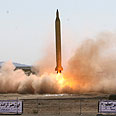
Europeans still asleep
Op-ed: Iran's pride won't let it renounce nuclear plans, but Europe fails to grasp this
The recent Iranian attack on the British embassy in Teheran raised Israeli expectations about the chance that the European Union would finally act in a decisive way against Iran. But the new round of sanctions is a far cry from the tough measures Jerusalem would like to see.
Former Israeli Ambassador to France Daniel Shek said in a TV interview on Channel 10 that “the new EU sanctions don’t hurt Europe and thus won’t hurt Iran either.” Other disgruntled Israeli commentators wondered what it would take for Europe to act against Iran. This happened after it became clear that the attack on the British embassy would not lead to crippling EU sanctions.
The outcome of the recent meeting of EU foreign ministers was further evidence of the wide gap in the perceptions of the Iranian threat between Jerusalem and Europe. For the EU, Iran seems to be a sideshow and a rather abstract and distant threat. For Israel, however, it is a matter of life and death.
This became clear from the amount of Iran-related articles that have been published in Israel recently, but also from the ongoing public debate about a military strike. Last week, former Mossad Chief Meir Dagan once again warned against an Israeli military attack on the Iranian nuclear program. The same day, Defense Minister Ehud Barak said that “Israel has no intention, at the moment, to take action against Iran, but is far from paralyzed by fear.” He also said that Israel must act calmly and quietly – we don’t need big wars.”
Earlier, another ex-Mossad Chief, Danny Yatom, expressed diametrically opposed positions to those of Meir Dagan. He said: “As difficult a price it may be, and even if those predicting apocalyptic results are correct - and I don’t think they are – this is still not as bad as the threat of an Iranian bomb.” He also said that the world has little time left to act on Iran.
Barak told CNN two weeks ago that there is probably only three quarters of a year left to stop the Iranian nuclear program. He added that a nuclear Iran will affect the entire Middle East and that as a result countries such as Saudi Arabia, Turkey and Egypt will also pursue nuclear weapons.
Earlier, Strategic Affairs Minister Moshe Ya'alon said that "those making decisions in Iran were still not convinced of the West's determination to stop Iran's nuclear program." He added that these were "critical hours" in determining where the world would go with its Iranian policy.
'Pride very important to us'
Another hint that indicates Israel might ultimately go its own way regarding Iran came from Prime Minister Benjamin Netanyahu. During a press conference with his Romanian counterpart, Netanyahu said that Israel recently has established unofficial ties with several Arab countries.
An Israeli government official later explained that these contacts - most probably with Saudi Arabia and the Gulf states - concern Iran.
Meanwhile, Iranian threats against Israel and the West are only increasing.
The head of the Revolutionary Guards’ Air Force said last week that “from now on Iran will respond to threats with threats, instead of taking a defensive stand.” Thereafter he threatened Turkey with an attack on the NATO rocket shield if Iran is attacked.
Earlier Supreme Leader Khamenei’s military advisor warned Israel that Hamas and Hezbollah will destroy Israeli cities with their rockets.
Mohammad Hashemi who planned the attack on the US embassy in 1979 told Mark Bowden, writer of the book Guests of the Ayatollah, the following in 2006:
"One of the features of the Iranian people is that it protests veraciously against oppression and injustice. Secondly our pride is very important to us. We can starve from hunger or lose everything, but we'll never sacrifice our pride."
This theme is also featuring prominently in Iran's rhetoric regarding the nuclear program. By now it should be clear that Iran will not voluntarily give up its nuclear program, even if this means that the country will be reduced to beggary.
It's highly doubtful, however, that anyone in Brussels will notice the writing on the wall.










